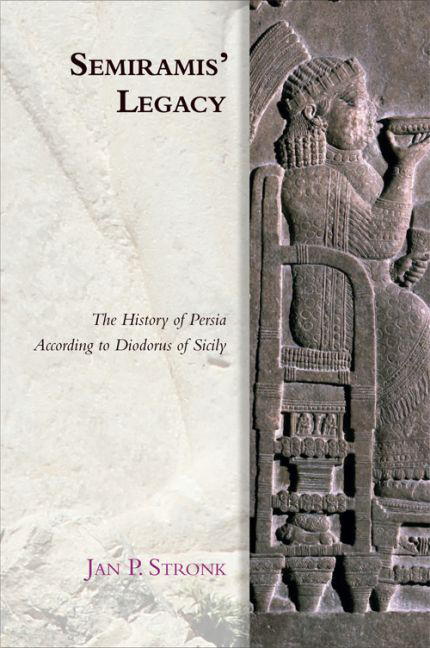Book contents
- Frontmatter
- Contents
- List of Figures and Tables
- Preface
- Abbreviations
- Series Editor's Preface
- Map
- Introduction: Diodorus' Work and Our Sources
- 1 Diodorus’ Sources
- 2 Ancient History: Assyrians, Chaldeans, and Medes
- 3 The Persians and the Greek Wars
- 4 Revolt and Sedition
- 5 Alexander the Great Defeats Darius III
- 6 From Persepolis to Babylon
- 7 The Period of the Diadochs: The Rift Opens
- 8 The Period of the Diadochs: The Rift Deepens
- 9 The Vicissitudes of the Diadoch Kingdoms: The Final Years of Diodorus' Persian Account
- 10 Semiramis' Legacy
- Conclusion
- Bibliography
- Index of Classical Sources
- Index of Modern Authors
- General Index
6 - From Persepolis to Babylon
Published online by Cambridge University Press: 10 May 2017
- Frontmatter
- Contents
- List of Figures and Tables
- Preface
- Abbreviations
- Series Editor's Preface
- Map
- Introduction: Diodorus' Work and Our Sources
- 1 Diodorus’ Sources
- 2 Ancient History: Assyrians, Chaldeans, and Medes
- 3 The Persians and the Greek Wars
- 4 Revolt and Sedition
- 5 Alexander the Great Defeats Darius III
- 6 From Persepolis to Babylon
- 7 The Period of the Diadochs: The Rift Opens
- 8 The Period of the Diadochs: The Rift Deepens
- 9 The Vicissitudes of the Diadoch Kingdoms: The Final Years of Diodorus' Persian Account
- 10 Semiramis' Legacy
- Conclusion
- Bibliography
- Index of Classical Sources
- Index of Modern Authors
- General Index
Summary
ALEXANDER PURSUES BESSUS
S. 119:
17.74.1–83.9:
Alexander in pursuit of Bessus:
(17.74.1) After this year was over, Cephisophon became archon at Athens [329/8], and Gaius Valerius and Marcus Clodius consuls in Rome. In their year of office, after Darius’ death, Bessus with Nabarzanes, Barzaentes, and many others, escaping from Alexander's hands, got to Bactria. Bessus, having been appointed satrap of this region by Darius and known to everyone because of his administration, now called upon the masses to defend their freedom. He pointed out that their country would assist them very much, as it was hard to invade and had a sufficient number of men to establish their independence. Having proclaimed that he would take command of the war and having convinced the people, he designated himself Great King. Thus, he enrolled soldiers, manufactured a stock of weapons, and ambitiously prepared all the other things for the approaching need. Seeing that the Macedonians regarded Darius’ death as the end of the campaign and were impatient to return to their homeland, Alexander, having called them all to a meeting and addressing them with proper words, got them compliant and ready for the remaining part of the expedition. However, assembling the allied troops from the Greek cities and praising them for their services, he released them from their military duty and gave to each of the cavalry a talent [60 minae or 6,000 drachmae] and each of the infantry ten minae [1,000 drachmae]. Besides this, he paid them both their due wages and those to cover their march back until they returned to their homes. To each of those who opted to remain in the royal army he gave three talents [18,000 drachmae]. He rewarded the soldiers with great gifts not only because he was generous by nature, but also because he had come into possession of very much money during the pursuit of Darius. In fact, he had received from the royal treasurers the sum of eight thousand talents [48,000,000 drachmae]. Apart from this, what was distributed to the soldiers, including clothing and goblets, amounted to thirteen thousand talents [78,000,000 drachmae]; the stolen or plundered items’ value was thought to be even more.
- Type
- Chapter
- Information
- Semiramis' LegacyThe History of Persia According to Diodorus of Sicily, pp. 334 - 382Publisher: Edinburgh University PressPrint publication year: 2017



